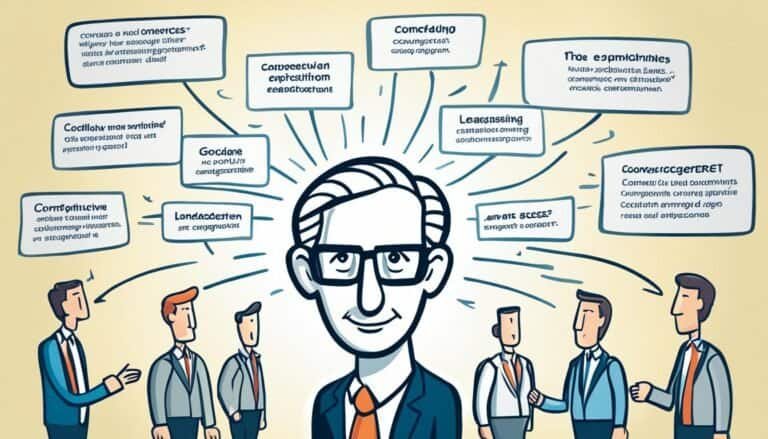What Is Critical Reflection?
Do you know that research shows only 10% of people engage in critical reflection regularly? Understanding what critical reflection entails is key to personal and professional development.
By questioning assumptions and analyzing beliefs, you open doors to new perspectives. The process goes beyond simple self-examination; it challenges you to think deeper and uncover hidden biases.
Stay tuned to discover how critical reflection can transform your approach to decision-making and problem-solving.
Key Takeaways
- Critical reflection enhances self-awareness and fosters personal growth through analyzing and evaluating thoughts and actions.
- It involves questioning assumptions, challenging norms, and promoting innovation for intellectual development.
- Techniques like journaling and mindful observation aid in daily application of critical reflection for personal transformation.
- The process of critical analysis involves breaking down complex information, evaluating evidence, and drawing conclusions for enhanced understanding.
Definition of Critical Reflection
Critical reflection is the process of analyzing and evaluating your own thoughts and actions to enhance self-awareness and foster intellectual growth. Engaging in critical reflection allows you to explore deeper into understanding the underlying reasons for your beliefs and behaviors. By examining your experiences, assumptions, and biases, you can gain insights that lead to personal development and improved decision-making in the future.
Self-awareness plays a pivotal role in critical reflection as it enables you to recognize your strengths, weaknesses, and areas for growth. Through introspection and self-assessment, you can identify patterns in your thinking and behavior, paving the way for continuous learning and improvement. This heightened self-awareness not only enhances your understanding of yourself but also contributes to your overall intellectual growth.
Importance of Self-Examination
Engaging in self-examination is a fundamental aspect of personal growth and intellectual development. Through self-awareness and introspective growth, individuals can gain valuable insights into their thoughts, behaviors, and emotions. Here are three reasons why self-examination is critical:
- Enhanced Self-Awareness:
Self-examination allows you to explore deep into your inner thoughts and feelings, leading to a better understanding of yourself. This increased self-awareness can help you identify your strengths, weaknesses, values, and beliefs, paving the way for personal growth.
- Promotes Personal Development:
By reflecting on past experiences and actions, you can learn from your mistakes, make better decisions, and set meaningful goals for the future. Self-examination acts as a catalyst for personal development, encouraging you to evolve and aim for self-improvement continually.
- Facilitates Emotional Intelligence:
Understanding your emotions and how they influence your thoughts and actions is essential for emotional intelligence. Self-examination fosters emotional awareness, enabling you to manage stress, communicate effectively, and build healthier relationships both personally and professionally.
Process of Critical Analysis
When engaging in critical analysis, you must consider key analytical steps that help break down complex information. Reflective questioning techniques aid in exploring assumptions and biases, while critical thinking strategies enhance your ability to evaluate evidence and draw informed conclusions.
By following these processes, you can develop a structured approach to examining ideas, arguments, and situations. This enables you to deepen your understanding and make well-informed judgments based on sound reasoning and evidence.
Utilizing these tools empowers you to navigate through complexities, challenge perspectives, and ultimately sharpen your critical thinking skills.
Key Analytical Steps
Utilize a systematic approach to dissect and evaluate the components of the subject matter when engaging in critical analysis. Employing an analytical approach is essential for a thorough examination of the topic at hand.
Here are three key analytical steps to guide your critical analysis:
- Identify the Key Elements: Break down the subject matter into its fundamental components to gain a clear understanding of its structure.
- Evaluate the Connections: Analyze how these components interact with each other and contribute to the overall context or meaning.
- Consider Different Perspectives: Encourage a reflective practice by looking at the topic from various viewpoints to broaden your insights and challenge assumptions.
Reflective Questioning Techniques
Breaking down the subject matter into its fundamental components is the initial step in applying reflective questioning techniques for critical analysis. Active listening and mindful inquiry play pivotal roles in this process. By actively engaging with the material and being present in the moment, you can better understand the nuances and underlying assumptions within the content.
Cultivating curiosity is another key aspect of reflective questioning. By approaching the subject matter with a sense of wonder and a desire to uncover hidden meanings, you can explore deeper into the layers of information presented.
Deep reflection is essential for asking probing questions that challenge your assumptions and push you to contemplate alternative perspectives. Through these techniques, you can enhance your critical analysis skills and gain a more thorough understanding of the subject matter.
Critical Thinking Strategies
To effectively engage in critical thinking strategies for the process of critical analysis, it's important to approach the subject matter with a discerning and inquisitive mindset, delving into the underlying layers of information to uncover deeper insights.
When focusing on self-awareness, acknowledge your biases and assumptions, allowing for a more important evaluation of the information at hand.
Problem-solving plays a critical role in critical thinking; break down complex issues into smaller components, analyze each part systematically, and then synthesize a detailed solution.
Lastly, cultivate a habit of continuous learning and reflection to refine your critical thinking skills over time.
Benefits of Challenging Assumptions
When you challenge assumptions, you push the boundaries of accepted knowledge and ideologies, prompting a reevaluation of established norms.
By questioning what's commonly believed, you open up new perspectives and possibilities for understanding complex issues.
This critical process allows for fresh insights to emerge, fostering intellectual growth and innovation.
Questioning Established Norms
Challenging established norms allows for a reevaluation of long-held assumptions and fosters a culture of critical thinking. When you question authority and challenge traditions, you open up space for growth and progress.
Here are three benefits of questioning established norms:
- Promoting Innovation: By challenging existing norms, you invite new ideas and perspectives, leading to innovative solutions and approaches.
- Encouraging Diversity: Questioning established norms encourages diversity of thought, allowing for a broader range of voices and experiences to be considered.
- Enhancing Problem-Solving Skills: When you challenge assumptions, you develop your analytical skills and learn to approach problems from different angles, ultimately improving your problem-solving abilities.
Opening New Perspectives
Questioning established norms and challenging assumptions can lead to a profound shift in perspective, opening new avenues for exploration and understanding. By daring to challenge the domain quo, you invite creative exploration and innovative thinking into your area of understanding.
This process allows you to break free from conventional thought patterns and embrace fresh perspectives and alternative viewpoints. When you actively engage in questioning assumptions, you create space for unconventional ideas to flourish, paving the way for innovative solutions and deeper insights.
Embracing this practice not only enriches your intellectual landscape but also encourages you to approach problems from diverse angles, fostering a spirit of curiosity and adaptability. Ultimately, by opening yourself up to new perspectives, you invite a world of possibilities and growth into your intellectual journey.
Techniques for Enhancing Insight
To enhance insight effectively, utilizing structured reflection exercises can be a valuable technique. Through intentional and focused practices, you can deepen your understanding and gain valuable perspectives.
Here are three techniques for enhancing insight:
- Journaling: Regularly writing down your thoughts, experiences, and reflections can help you engage in insightful exploration. By asking yourself thought-provoking questions in your journal, you can uncover new insights and patterns that may not have been apparent otherwise.
- Mind Mapping: Creating visual representations of your thoughts and ideas can lead to enhancing understanding. Mind mapping allows you to see connections between different concepts, sparking new insights and promoting a deeper level of reflection.
- Peer Feedback: Seeking feedback from peers or mentors can provide you with fresh perspectives and challenge your assumptions. Engaging in dialogue with others can help you see situations from different angles, leading to enhanced insight and critical reflection.
Application in Daily Life
Incorporating the techniques for enhancing insight into your daily life can lead to a deeper understanding of your experiences and perspectives. By practicing mindful observation and introspective analysis, you can cultivate a habit of practical application and everyday mindfulness. This approach enables you to engage with your thoughts, emotions, and actions in a more intentional manner, fostering personal growth and self-awareness.
| Mindful Observation | Introspective Analysis | Practical Application |
|---|---|---|
| Focus on the present moment | Reflect on past experiences | Implement lessons learned into daily life |
| Notice thoughts without judgment | Analyze beliefs and values | Make conscious choices |
| Observe emotions without attachment | Explore underlying motivations | Cultivate gratitude and empathy |
| Pay attention to sensations in the body | Identify patterns of behavior | Practice self-care and emotional regulation |
Impact on Personal Growth
Enhancing personal growth through the practice of mindful observation and introspective analysis fosters a deeper understanding of oneself and promotes self-awareness. Engaging in critical reflection can have a profound impact on your personal development by encouraging you to explore into your thoughts, emotions, and actions.
Here's how critical reflection can influence your journey towards personal growth:
- Self-awareness: By engaging in critical reflection, you become more attuned to your values, beliefs, strengths, and areas for improvement. This heightened self-awareness enables you to make more informed decisions and navigate challenges with greater clarity.
- Growth mindset: Embracing critical reflection nurtures a growth mindset, where you view challenges as opportunities for learning and development. This shift in perspective empowers you to approach new experiences with openness and resilience.
- Introspective journey: Critical reflection propels you on an introspective journey of self-discovery and growth. It allows you to unravel layers of your identity, confront limiting beliefs, and cultivate a deeper connection with yourself, paving the way for personal transformation.
Conclusion
To summarize, critical reflection is a powerful tool for personal growth and self-improvement. By challenging assumptions, examining oneself, and analyzing situations, you can enhance your insight and make more informed decisions.
This process not only benefits you in daily life but also contributes to your overall development. Embrace the practice of critical reflection to deepen your understanding, broaden your perspectives, and ultimately, become a more well-rounded individual.







